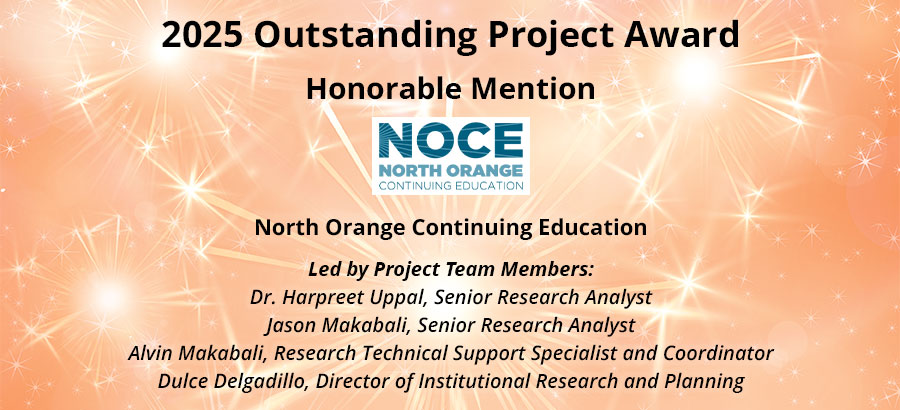
North Orange Continuing Education
Led by Project Team Members:
Dr. Harpreet Uppal, Senior Research Analyst
Jason Makabali, Senior Research Analyst
Alvin Makabali, Research Technical Support Specialist and Coordinator
Dulce Delgadillo, Director of Institutional Research and Planning
In celebration of their hard work and dedication, The RP Group is pleased to acknowledge North Orange Continuing Education (NOCE) with an honorable mention for the 2025 RP Group Outstanding Project Award.
Their project, “From Enrollment to Completion: Exploring Noncredit Time to Completion,” aimed to understand and address the time it takes noncredit students to complete their educational goals, focusing on populations served by NOCE.
Noncredit programs are vital for supporting diverse student groups, including adult learners, English language learners, and those pursuing high school equivalency. These programs are uniquely positioned to provide flexible, accessible, and affordable education to marginalized populations often facing significant barriers.
The project’s goals were to analyze the average and median time to completion across various noncredit programs and identify factors influencing these timelines, such as concurrent enrollment, transfer credits, and enrollment gaps. By exploring the experiences of completers and non-completers, the study sought to illuminate the barriers students face and provide actionable recommendations for institutional improvement.
Methodologically, the research examined enrollment data, completion records, and demographic variables for programs like High School Diploma, Career Technical Education (CTE), and English as a Second Language (ESL). Specific variables included concurrent enrollment patterns, credit transfer, and the presence and length of enrollment gaps. The analysis revealed significant insights, such as the impact of gap years on completion times, which ranged from one to 18 years, and highlighted the barriers that prolonged completion, including work commitments, lack of tailored support, and external challenges like childcare and transportation.
This project contributes to a deeper understanding of how traditional credit-based methodologies and metrics may not fully align with noncredit programs. Noncredit education serves populations with unique needs and pathways, and understanding these programs and the experiences of their students is critical to developing meaningful metrics and milestones. These insights are essential for designing systems and interventions that truly reflect and support noncredit learners’ journeys.
Key findings emphasized the importance of addressing these barriers to improve equitable access and success. Lessons learned include the need for robust support systems, better communication of available resources, and targeted interventions. For example, High School Diploma students with consistent enrollment completed their programs significantly faster than those with gaps.
Stakeholders impacted by the project include adult learners, faculty, and institutional leaders. By sharing these findings, NOCE aims to foster data-informed decision-making that improves student outcomes and ensures noncredit education remains a viable pathway for nontraditional learners.